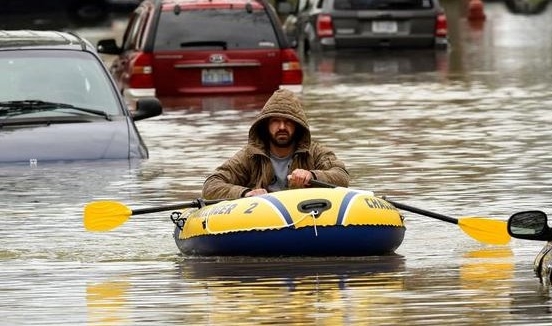Health
Following record-breaking rainfall and the resulting failure of two dams in Michigan, floodwaters forced the evacuation of 11,000 people and threatened to inundate the Dow chemical complex and expose local waterways to toxic pollutants. (NBC News, The Washington Post)A new study revealed that warming sea surface temperatures are increasing the intensity of hurricanes, typhoons and tropical cyclones by 8 percent per decade. (CNN)Cyclone Amphan has displaced nearly 3 million residents in India and Bangladesh amid rising coronavirus infections. (CNN)A new report projects that severe heatwaves and drought will occur two and a half times more frequently than in previous centuries due to rising greenhouse gas emissions. (The Guardian)Equity
Lack of access to healthcare services and the sustained operation of polluting industrial sites in low-income and minority communities continue to contribute to disproportionate COVID-19 impacts in the U.S. (The New York Times)As the Bureau of Land Management (BLM) transitions to virtual public hearings, inconsistent internet access has left many Native Americans unable to voice concerns over proposed oil and gas projects on nearby public lands. (The Washington Post)
Politics & Economy
While the BLM drastically reduces royalty and lease payments for oil and gas companies during the coronavirus pandemic, solar and wind operators are receiving retroactive rent bills from the Interior Department. (The Washington Post, Reuters)
A recent survey found that 73 percent of Americans believe climate change is happening, with 62 percent acknowledging human activity as a major cause. (The New York Times)
Action
Forty-two faith organizations across 14 countries have announced they will divest from fossil fuels following calls from the Vatican for the world to embrace a sustainable post-coronavirus future. (AP News)
Ahead of the UN’s anticipated adoption of the 30 by 30 framework next year, which aims to protect 30 percent of the planet from exploitation by 2030, the European Commission has pledged to raise $21 billion to fund the effort in the EU. (Los Angeles Times, The Guardian)
Canada will require its largest companies to publish annual climate impact reports and commit future operations to national climate goals to receive COVID-19 economic aid. (Yale Environment 360)
Bowing to pressure from employees and activists, Google has announced that it will no longer develop artificial intelligence or machine learning algorithms to enhance fossil fuel extraction abilities for the oil and gas industry. (OneZero)
Kicker
Missing the great outdoors? Check out these breathtaking photos of spring around the world. |

